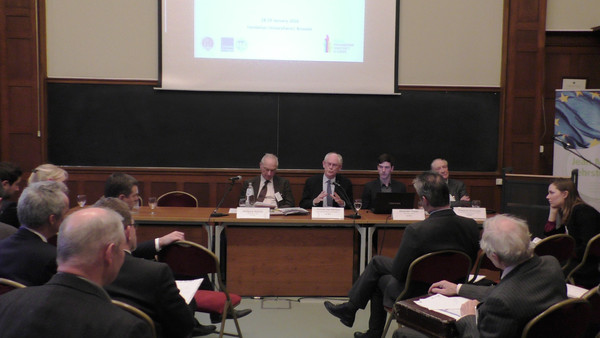
Session: Opening Speech and Discussion, Thursday 28th January 2016, 3-4 pm
Speaker: Herman van Rompuy
Rapporteur: Johannes Wolters
On Thursday, January 28th 2016, former President of the European Council Herman van Rompuy gave a speech on the role of the Presidency of the European Council within the institutional architecture of the EU. The following discussion focused primarily on its role during the euro crisis and was chaired by Wolfgang Wessels (University of Cologne).
Former President of the European Council Herman van Rompuy began his speech by highlighting his special role as the first office holder of the permanent Presidency of the European Council. Referring to the paradox of commanding close to no substantial formal prerogatives while at the same time wielding important informal powers, Mr. van Rompuy elaborated on the significance of informal coordination. Van Rompuy highlighted the importance of regular meetings with the Presidents of the Commission and the European Parliament by referring to the bargain on the solution of the 2013 Cypriot financial crisis: in addition to the Heads of State or Government (HoSG), the decisive coordination meeting included the heads of the ECB, the Eurogroup, the Commission, and the IMF. He continued by delineating the relations of the Presidency with the European Parliament and the Commission. Although he had regularly reported to the European Parliament on European Council and Euro Summit sessions, he emphasized that no formal accountability or scrutiny can be derived from this reporting. According to van Rompuy, the Commission has been strengthened considerably by intergovernmental treaties, such as the Fiscal Compact and the ESM. Consequently, cooperation between the Presidencies of the European Council and the Commission should be intensified: ‘Presidents have to be in the driving seat’.
As to intra-European Council relations, van Rompuy highlighted the necessity for permanent consensus building among the HosG, primarily due to the many divides within the European Council: North/South, Left/Right, Euro/non-Euro countries. While stressing the necessity of a Franco-German agreement for progress within the Council, van Rompuy emphasized that there is no Franco-German domination of the institution. With respect to Foreign Affairs, according to van Rompuy, the permanent Presidency significantly benefitted the relations with third countries. Regardless, he described his rapport with the first High Representative Catharine Ashton euphemistically as ‘work in progress’. Furthermore, the speaker pointed to the necessity of what he called the ‘crisis mode’ for decision-making within the European Council: according to van Rompuy, the euro crisis has shown that substantial decisions can be reached almost exclusively under external pressure when leadership is widely expected from the European Council / the Euro Summit. Lastly, van Rompuy underlined the importance of building a confidential relationship within the European Council and trust toward the presidency as a necessary condition for agreements.
In the following debate, van Rompuy was asked for his opinion on a so-called ‘big double hat’, i.e. the merger of the presidencies of European Council and the Commission, as well as on a potential direct election of the Commission. While he advised against the first proposal out of efficacy reasons, his stance on the latter proposal was more outspoken: further legitimizing the Commission without granting additional powers would create expectations that the Commission would not be able to live up to. Asked about the differences of the challenges of the refugee crisis and the euro crisis, van Rompuy commented that in the former, no clear solution seems foreseeable and basic feelings (such as identity) are at stake. Sergio Fabbrini (LUISS School of Governance) asked how the accountability of the strengthened Commission and the European Council could be enhanced. Hereupon, van Rompuy stressed why he had not involved the European Parliament in the imminent crisis decisions: British PM David Cameron had rejected an agreement within the treaties so that an involvement of the EP would have made the bargaining even more complicated to the extent that a solution seemed impossible. Hence, intergovernmental treaties were preferred way to move forward.


